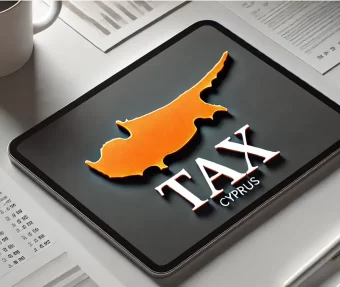Taxes for Individuals in Cyprus 2026

Content
Taxes in Cyprus for individuals as of January 1, 2026 are governed by updated rules of the tax reform, which affected key elements: personal income tax, dividends, family deductions, and rental income.
This article provides a detailed overview of taxes in Cyprus for individuals, the conditions for obtaining Cypriot tax residency, and the practical aspects of taxation.
Why Cyprus is attractive for individual taxation
The Cypriot tax system is designed to attract foreign professionals, entrepreneurs, and investors and allows for a legal reduction of the tax burden while fully complying with EU legislation.
- Low personal income tax rates;
- No wealth tax or inheritance tax;
- No annual property ownership tax;
- Moderate contributions to social and medical insurance;
- Special tax incentives for new residents and highly paid professionals;
- Non-dom status, which provides for a 0% tax on dividends and interest income.
It is precisely the combination of a European jurisdiction, transparent rules, and favorable taxation that makes Cyprus one of the best options for individuals.
Individual Tax Residency in Cyprus
Tax residency is a key factor that determines in which country and on which income an individual is required to pay taxes.
- All individuals who are tax residents of Cyprus are required to pay taxes in Cyprus on their income received anywhere in the world.
- Individuals who are not tax residents of Cyprus are taxed only on certain types of income received or earned within the territory of this country.
In order to optimize their taxes in Cyprus, foreign nationals may choose one of two options to obtain tax residency status.
- An individual is considered a tax resident of Cyprus if they are physically present in the country for more than 183 days during one calendar year. This option is suitable for those who permanently reside in Cyprus; families relocating to the island for a long period; employees and entrepreneurs who conduct business from Cyprus.
- The second option for tax residency — the 60-day rule — is one of Cyprus’s key competitive advantages and has no equivalents in the EU. This regime is in demand among businesspeople and investors who value mobility and cannot spend most of the year in one country. It allows an individual to become a tax resident of Cyprus by spending only 60 days per year on the island, provided that all established conditions are met. A detailed guide on how to become a tax resident of Cyprus in 60 days.
Non-Domiciled Resident Status (Non-Domicile)
Non-dom status allows tax residents of Cyprus not to pay the Special Defence Contribution (SDC, which in 2026 amounts to 5%) on the most important types of passive income — dividends and interest. For many clients, these taxes constitute the main part of their tax burden, which is why non-dom status plays an important role in tax planning.
Non-dom status is available to individuals who:
- are tax residents of Cyprus;
- have not lived in Cyprus for 17 out of the 20 years prior to obtaining residency.
In other words, most foreigners who obtain Cyprus tax residency for the first time initially meet the non-dom criteria.
It should be emphasized separately that non-dom status in Cyprus is not granted automatically. To obtain it, it is necessary to: submit an application to the Cyprus Tax Department; confirm compliance with the criteria; and then receive an official non-dom certificate (Non-Domicile Certificate).
Taxes for Individuals in Cyprus in 2026
1. Personal Income Tax
Tax residents of Cyprus will pay less personal income tax, as from January 1, 2026 the amount of tax-free income has been increased. The 0% rate now applies to annual income up to €22,000 (previously €19,500). This means that the first €22,000 of earnings are not subject to personal income tax, which directly increases net income.
| Annual income (EUR) | Income tax rate |
| Up to €22 000 | 0% |
| €22 001 – €32 000 | 20% |
| €32 001 – €42 000 | 25% |
| €42 001 – €72 000 | 30% |
| Over €72 001 | 35% |
Incentives for first employment in Cyprus: individuals with a salary exceeding €55,000 per year who were not tax residents of Cyprus prior to the commencement of employment, but subsequently became tax residents, are entitled to an exemption from personal income tax of up to 50%.
New incentives and deductions for individuals
One of the elements of the reform is the introduction of income-dependent household deductions. Eligibility for deductions is determined based on total annual income and family composition.
For married couples or cohabitees, combined household income thresholds apply and vary depending on the number of dependent children:
- Up to €90,000 (no dependent children)
- Up to €100,000 (one or two dependent children)
- Up to €150,000 (three or four dependent children)
- Up to €200,000 (five or more dependent children)
For single individuals, the relevant income threshold is €40,000.
Where thresholds are satisfied, deductions are available to each spouse or cohabitee individually, an important feature for dual-income households.
Key deductions include child-related allowances (including students up to the age of 24), housing expenses (mortgage or rent), “green” investments, and home insurance. For example: a deduction of €1,000 for the first child, €1,250 for the second child, and €1,500 for the third and each subsequent child for each parent. Up to €2,000 per person for mortgage interest on a primary residence. A home insurance deduction of up to €500 per person.
Eligibility for deductions is determined annually based on income and family status as of December 31 of the relevant tax year.
Foreign Pension Income
The favourable regime for foreign pension income is retained and updated. Cyprus tax residents receiving pension income from abroad may continue to elect annually between:
- taxation under the standard progressive income tax scale; or
- a flat 5% tax on pension income exceeding €5,000 per year.
This regime remains a cornerstone of Cyprus’ attractiveness for retirees relocating to the island.
2. Dividend Income
Dividends in Cyprus are not subject to personal income tax. Accordingly, dividends are not included in the personal income tax base. If non-dom status applies, dividends are also exempt from the Special Defence Contribution (SDC).
Contributions to the National Health Insurance System (GeSY) are payable on received dividends at a rate of 2.65%.

3. Contributions to State Social and Medical Insurance Funds
- For employees and employers: in 2026, the contribution to the state social insurance fund amounts to 8.8%. Going forward, the rate will increase every five years until it reaches 10.7% as of January 1, 2039.
- For self-employed individuals: 16.6% of income.
- Contributions to the state medical insurance fund (GeSY) vary depending on the category (company employees, self-employed individuals, office holders). For example, for company employees the rate is 2.65%, while for self-employed individuals it is 4%.
4. Rental Income from Real Estate
Income derived from renting out real estate in Cyprus is subject to personal income tax. Rental income is included in the taxpayer’s total annual income and is taxed according to the applicable progressive personal income tax scale, taking into account available deductions and the tax-free threshold. At the same time, the taxable base may be reduced by legally allowed expenses related to the maintenance and management of the property.
In addition, contributions to the National Health Insurance System (GHS) are payable on rental income at a rate of 2.65%.
5. Capital Gains Tax
Capital gains tax applies only to the sale of real estate located in Cyprus or to the sale of shares in companies that own Cypriot real estate. Profits from the sale of foreign real estate are exempt from tax.
The standard capital gains tax rate is 20% and is calculated on the difference between the sale price and the acquisition cost of the asset, taking into account allowable adjustments.
Under the 2026 tax reform, the capital gains tax rate remained at 20%, while the amounts of tax-free allowances were significantly increased.
Lifetime CGT exemptions are increased as follows:
- General exemption: from €17,086 to €30,000
- Agricultural land: from €25,629 to €50,000
- Primary residence: from €85,430 to €150,000
6. Crypto-Assets and Share Schemes
Specific regimes are introduced for:
- crypto-asset gains, taxed at 8% with same-year loss offset; and
- benefits under approved employee share schemes, also taxed at 8% within statutory limits.
More details: Cryptocurrency Tax 2026.
How to pay taxes and file a personal tax return in Cyprus?
Filing a tax return in Cyprus is carried out electronically through the official tax authority portal Tax For All.
To file a tax return in Cyprus, an individual must:
- be registered in the tax system of the Republic of Cyprus;
- have a Tax Identification Code (TIC);
- have access to a personal account on the Tax For All portal.
In accordance with the 2026 tax reform:
- All tax residents aged from 25 to 71 are required to file a tax return in Cyprus regardless of their income level.
- A Cyprus tax return is required even if there is no income or if the tax payable is zero.
- This new rule is applied for the first time to the 2026 tax year, while the actual filing of the return takes place in 2027.
The Tax Department of the Republic of Cyprus has developed an online calculator to calculate personal income tax under the new rules. The Cyprus tax calculator is available on the official website of the Tax Department in the Tax Reform 2026 section. The calculator is intended for preliminary estimates only.
Feod Group: Tax Advisory Services in Cyprus
The practical application of tax incentives, non-dom status, tax residency rules, and deductions requires a professional approach and proper planning. That is why, before relocating, changing tax residency, or filing a tax return in Cyprus, it is recommended to obtain advice from a tax specialist.
Feod Group provides professional tax consulting and support services for individuals in Cyprus.
Our services include:
- determining and confirming Cyprus tax residency (under the 183-day or 60-day rule);
- obtaining and supporting non-dom status;
- tax planning prior to relocation or change of residency;
- preparation and filing of tax returns;
- optimizing tax burden considering all available incentives, deductions, and international rules;
- advice on income tax, dividends, cryptocurrency, capital gains, rental income, and contributions to GeSY and social insurance.
Feod Group works with international clients considering relocation to Cyprus, changing tax residency, or seeking full compliance with current tax legislation.
For matters related to taxation in Cyprus and tax support for individuals, you may seek professional consultation.
Online consultations | Office in Larnaca
Book a consultation
FAQ
What taxes do individuals pay in Cyprus in 2026?
Individuals in Cyprus may be subject to personal income tax, contributions to the GHS medical insurance system, social insurance contributions, capital gains tax on the sale of real estate, as well as taxes on rental income. If non-dom status applies, dividends and interest income are exempt from the Special Defence Contribution (SDC).
Are foreign-source incomes taxed in Cyprus?
Tax residents of Cyprus are required to declare and pay taxes on their worldwide income. Non-residents of Cyprus are taxed only on income derived from sources within Cyprus.
Is it necessary to file a tax return in Cyprus?
Yes. Starting with reporting for the 2026 tax year, all tax residents of Cyprus aged from 25 to 71 are required to file a tax return regardless of income level or the amount of tax payable.
Is there a tax calculator in Cyprus?
Yes. For preliminary tax calculations in Cyprus, online calculators are available that allow individuals to estimate personal income tax, contributions to the medical insurance system (GHS), and social insurance based on annual income. The calculator is available on the official website of the Tax Department.
Contact us
For enquiries please fill in the form below. Our consultants will contact you with the details.
Griva Digeni 49, Chrystalla Court 1st Floor Office 11, 6036 Larnaca, Cyprus
11B Lyuteranska St., off. 23, 01024


